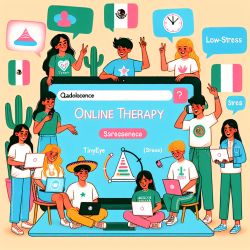Introduction
In the field of speech-language pathology, practitioners are constantly seeking new ways to improve outcomes for children. One area that has garnered attention is the concept of Extreme Overvalued Beliefs (EOBs), as explored in the research article "Extreme Overvalued Beliefs: How Violent Extremist Beliefs Become 'Normalized'." Understanding these beliefs and their impact can be crucial for practitioners working with children, especially in environments where such beliefs might be prevalent.
What Are Extreme Overvalued Beliefs?
Extreme Overvalued Beliefs are rigidly held, non-delusional beliefs that are often shared within a cultural or subcultural group. Unlike delusions or obsessions, these beliefs are not resisted but are instead amplified and defended by the individual. The research highlights how these beliefs can become normalized and lead to extreme behaviors, including violence.
Implications for Practitioners
For speech-language pathologists, understanding EOBs is essential for several reasons:
- Early Identification: Recognizing signs of EOBs in children can help practitioners address potential issues before they escalate.
- Communication Strategies: Developing communication strategies that challenge these beliefs can be part of a comprehensive therapy plan.
- Collaboration with Other Professionals: Working alongside psychologists and educators can provide a multi-faceted approach to addressing EOBs.
Data-Driven Approaches
Implementing data-driven approaches is crucial when dealing with EOBs. Practitioners can utilize assessments and monitoring tools to track changes in a child's belief systems and behaviors. By analyzing this data, practitioners can make informed decisions about the best interventions to use.
Encouraging Further Research
While the current research provides a foundation, there is a need for further studies to explore the prevalence and impact of EOBs in children. Practitioners are encouraged to engage in research initiatives or collaborate with academic institutions to contribute to this growing field.
Conclusion
Understanding Extreme Overvalued Beliefs is a step towards creating better outcomes for children in speech-language pathology. By recognizing these beliefs and implementing data-driven strategies, practitioners can play a pivotal role in addressing and mitigating the effects of EOBs.
To read the original research paper, please follow this link: Extreme Overvalued Beliefs: How Violent Extremist Beliefs Become “Normalized”.










